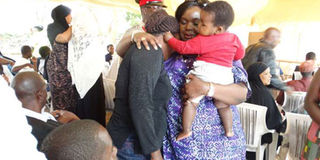Leaders from across the divide mourn heroes killed in Somalia

Defence Cabinet Secretary Raychelle Omamo at Forces Memorial Hospital on January 28, 2017 condoling a family of a KDF soldier who died on January 27, 2017 during an attack in Somalia. PHOTO | WILLIAM OERI | NATION MEDIA GROUP
What you need to know:
- British High Commissioner to Kenya Nic Hailey said the Kenyan soldiers died bravely for the region’s and world’s security.
- Wiper leader Kalonzo Musyoka said the attack on the Kenyan forces is an indication that Amisom lacks what it takes to fight the insurgents.
A cross-section of leaders on Saturday sent their condolences following the attack on a Kenya Defence Forces base in Somalia, the second major attack since Kenya joined the Amisom mission.
Cord leader Raila Odinga, while condemning the attack, claimed it had been established “beyond doubt” that soldiers killed by Al-Shabaab in Somalia were in their dozens.
“We have now established beyond doubt that tens of our soldiers died in the line of duty in Somalia following an attack by militants,” he said in a statement.
Wiper Democratic Movement leader Kalonzo Musyoka said the attack on the Kenyan forces in Somalia is an indication that the African Union Mission in Somalia (Amisom) lacks what it takes to fight the insurgents.
“Amisom is poorly funded to undertake its mission in Somalia and the outcome is the deaths we keep witnessing of our forces,” he said.
The former Vice-President also faulted the Jubilee administration for “withholding” information about the number of soldiers killed in the attack, said to have taken place at dawn on Friday at the border town between Kenya and Somalia.
Meanwhile, African Union Commission Chairperson Nkosazana Dlamini-Zuma condemned the attack at Kulbiyow inside Somalia, vowing that the AU would not relent in pursuing the terrorists.
British High Commissioner to Kenya Nic Hailey said the Kenyan soldiers died bravely for the region’s and world’s security, adding that the United Kingdom stood with Kenya in its mission to fight terrorism and stabilise Somalia.
Meanwhile, at Umash Funeral Home in Nairobi, KDF and military police ambulances could be seen entering and leaving the premises, although a mortuary attendant remained cagey on what the vehicles had been doing there.
He had earlier disclosed that some bodies had been taken there on Friday evening, but the mortuary declined to receive them, since there was no capacity to accommodate them.
“Some bodies were brought here by a KDF ambulance but we did not take them since we had no capacity. We asked them to take them to the Forces Memorial mortuary. We do not like taking up complicated work,” he said without explaining.
Even as he spoke, a military ambulance, the seize of a small truck, was stationed inside the morgue’s compound, for at least one hour, before it left and headed back to the military hospital, which is a short distance across Mbagathi Road.
Almost simultaneously, an ambulance truck entered the funeral home, and it was not clear what its mission was at the facility.
The mortuary attendant, who did not give his name, or ask for the identity of journalists who had been making the enquiries, had first said the mortuary had not received any bodies, and told the Sunday Nation they were transported to the mortuary at the military hospital, before again suggesting that we check at nearby Montezuma funeral home.
A guard at the hospital confirmed military trucks and ambulances had made several trips in and out of the mortuary, adding that he was not aware what they were doing there, and neither had he seen any bodies being offloaded from the trucks.




